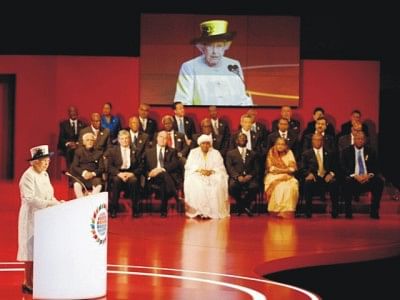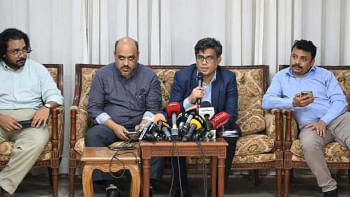Commonwealth Heads of Government Meeting: An analysis

Photo: AFP
Queen Elizabeth II is now in Australia and the attention of the world is focused at Perth, where the CHOGM is being held from October 28 to 30.
The 54 member states comprise countries from all six continents with a population of over 2 billion. Some states are large, many small, a few developed and some less developed. But all have equal status and are linked by common goals. These include promotion of democracy, human rights, good governance, rule of law, individual liberty, egalitarianism, free trade, multilateralism and world peace.
The Commonwealth is also a forum for non-governmental organisations, known as the Commonwealth Family. Among them, the most visible one is the Commonwealth Games. All the organisations foster strong links -- political, legal and historical. It is a remarkable organisation because of its diversity as an association and membership united by a set of shared values. Absence of a Security Council, like the one in the UN, to veto decisions forges greater friendship. The Retreat, where all heads of state can hold informal discussions and call on the queen separately to express their opinions, is a unique form of interaction. The Queen, as Head of the Commonwealth, is the strongest bond that links the member states together.
In the past, CHOGMs have developed common policies on contentious issues affecting member states. For instance, earlier CHOGMs had objected to the continuation of apartheid rule in South Africa and considered how to end it, to military coups in Pakistan and Fiji and to allegations of electoral fraud in Zimbabwe. These countries were suspended from the Commonwealth for periods of time for violation of human rights.
From 1997, the meetings identified official themes on which discussions had been focused.
The theme of the current CHOGM is "Building National Resilience, Building Global Resilience." This will assist member states to address the challenges at different levels: as individual member state, as members of the Commonwealth and as an integral part of the global community.
CHOGM 2011 faces multifarious issues. They include global economic fragility; food insecurity; adverse effects of climate change; lack of social cohesion and violation of human rights. Part of the background scenario is the political unrest in the Middle East and North Africa, where people are demanding democracy and good governance, which are two major goals of the Commonwealth.
One action that can be taken to avoid future crises and reduce inequality would be for the CHOGM to develop policy coherence for reforms of global economic governance in collaboration with IFIs, multilateral organisations like UN agencies, OECD, WTO and regional bodies like Asean, Saarc and others.
While there has been progress in poverty reduction and MDGs, the recent financial vulnerability and escalation of food prices have undermined much of the improvement made in many countries, and millions of people have become poorer. Since the CHOGM of 2009, income inequality has widened. Employment-led growth is necessary to improve livelihoods.
Women as "Agents of Change" have been prioritised for discussion. Cameron proposed a change of the law of male primogeniture and the bar against Catholics to allow the first born in the British Royal family, whether male or female, to inherit the crown. This has been welcomed by the 16 countries that have the Queen as Head of State.
This CHOGM decided that member countries will intervene in the activities of other states if there is evidence of violation of human rights.
Democracy has to be strengthened with mechanism for accountability and transparency with realistic plans and support from the Secretariat and member states.
Decision should be taken to carry out audits of performance of all governments based on the Harare Commonwealth Declaration of 1991. This would assess the status of democracy and socio-economic growth of member countries for future interventions.
The Commonwealth Ministers' Action Group (CMAG) could have more resilient functions. Recent information from Perth reveals that the Report of the Eminent Persons Group entitled "A Commonwealth of People: Time for Urgent Reforms" is under lock and key. The outgoing Chairperson, the Prime Minister of Trinidad and Tobago, who hosted the CHOGM in 2009, has stated that the Report was for the last CHOGM, consequently proper process has to be followed for any re-submission to the same Heads of Government. This near suppression has been less than pleasant for many.
One of the areas that have to be discussed is how to make the Secretariat more relevant 62 years after its inception. The Commonwealth Foundation has been criticised for poor management and the Commonwealth Games held in India was clouded by delay, corruption and weak organisation. These have tarnished the reputation of the Commonwealth.
The Commonwealth Secretariat no longer has the reputation it enjoyed in the 1980s as a strong voice on human rights when, according to The Times, it "led the world struggle" to achieve democracy and rule of law. The Commonwealth must rise to new heights of excellence to be relevant and effective.
Australia, Britain and Canada favour a stronger stance on human rights. President Rajapaksha of Sri Lanka is now in Perth. Rights groups state that the CHOGM has a moral and a legal obligation to hold Rajapaksha's government responsible for war crimes in the 2009 offensive against Tamil Tigers. This view is endorsed by Julia Gallard, host of the current CHOGM.
Most Commonwealth leaders are now in Perth for the Summit although the Prime Minister of India has pulled out and Ansari is representing India. Fiji is absent after being suspended in 2006.
The CHOGM discussions will cover how the Secretariat could be made more effective to deliver results within limited means. Deliberations should include improving capacities of member states and social transformation to eliminate poverty and ensure democratic processes. Innovative reforms will be needed for future success for the Commonwealth to leave a legacy of good governance, human rights and peace.

 For all latest news, follow The Daily Star's Google News channel.
For all latest news, follow The Daily Star's Google News channel. 



Comments